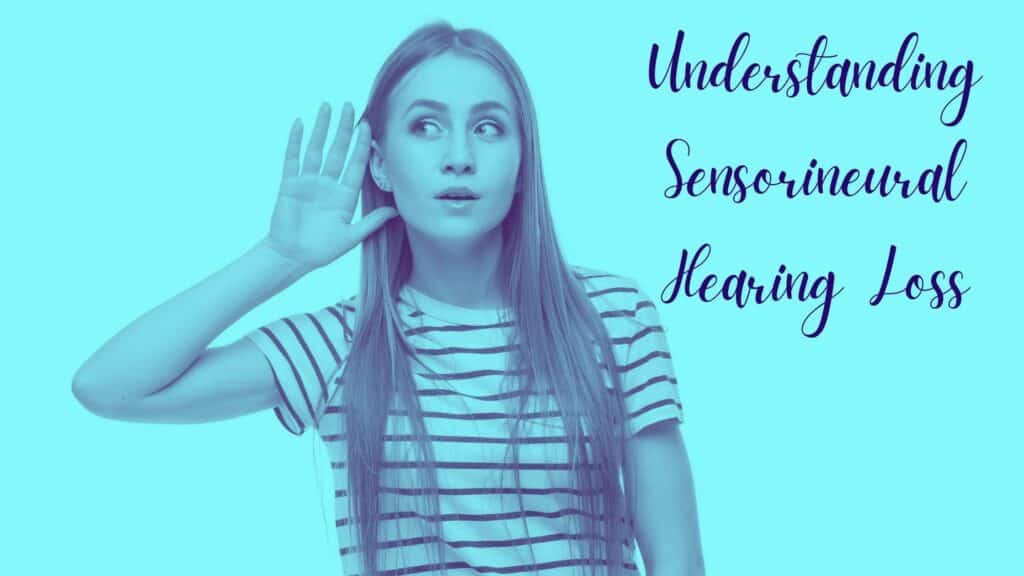There are three main types of hearing loss, each caused by different factors. The types of hearing loss are sensorineural hearing loss, conductive hearing loss, and mixed hearing loss.
Of these types of hearing loss, sensorineural hearing loss is the most common, affecting millions of Americans of all ages. Both age-related hearing loss and noise-induced hearing loss are types of sensorineural hearing loss.
What is Sensorineural Hearing Loss?
Sensorineural hearing loss is a type of hearing loss that usually starts in the inner ear. The fluid-filled inner ear is called the cochlea. Floating in this fluid are the cilia or tiny hair cells. When sound waves hit the eardrum, the fluid moves, and the cilia move too. They register this movement and send signals to the brain about the movement. Then the brain takes all the signals from the inner ear cells and interprets these signals as sound. That’s how you hear different pitches as well as different volumes.
But these delicate cells are easily damaged. And after they’re damaged, they can’t be repaired. They stop sending signals to the brain about certain sounds and you experience hearing loss.
What Causes Sensorineural Hearing Loss?
Anything that can damage the cells in the ears can cause sensorineural hearing loss. These are some of the most common causes of sensorineural hearing loss:
- Noise: Very loud noise can create more movement in fluid in the inner ear. If the movement is too intense, the hair cells get damaged. Noise is a common cause of hearing loss in children, teens, and adults.
- Age: Age is another common cause of sensorineural hearing loss. After years of sending signals to the brain, the cells may eventually get damaged or die. As you get older, your ears have also been exposed to a lifetime of stress, noise, medications, and other health conditions, all of which may cause hearing loss.
- Ear infections: Another cause of hearing loss is ear infections. An inner ear infection can damage the cells in the inner ear. Treating the ear infection with antibiotics can clear up the infection, but sometimes an ear infection can permanently damage hearing.
- Head trauma: An accident or injury can cause sensorineural hearing loss. For example, concussions can damage the cells in the ear and cause hearing loss.
- Medications: There are a few medications that are ototoxic, or harmful to the ears. Some antibiotics and chemotherapy drugs can damage the cells in the ear and cause hearing loss.
What Does Sensorineural Hearing Loss Sound Like?
Sensorineural hearing loss doesn’t just affect certain pitches. It also affects the overall clarity of the sounds that you hear. If you have sensorineural hearing loss, there are some sounds that you won’t hear at a soft volume. And even at a louder volume, you may have a hard time hearing the sound. The sounds you do hear also lose some of their clarity and crispness. Soft sounds may seem too soft, and loud sounds might seem muddy or much too loud.
Sensorineural hearing loss also makes it much more difficult to follow conversations. That’s because certain speech sounds may be harder to hear. Consonants might get lost or seem muffled. So even if you’re focusing all your energy on hearing and you think you can hear every word, you’ll have a hard time understanding what is being said.
Treating Sensorineural Hearing Loss
Usually, the best treatment option for sensorineural hearing loss are quality hearing aids. These advanced hearing devices are programmed to match your unique hearing needs. Sounds you don’t hear very well will be amplified, but the sounds you’re hearing normally won’t get too loud. This prevents distortion and makes it easier for you to hear. Modern hearing technology offers a range of advanced programs and settings to help you hear in background noise, in large venues, at home, or even outside. You can even get hearing aids that wirelessly connect to your smartphone or computer, giving you even more options when it comes to hearing.
Call us today to book a hearing test and find out if you have sensorineural hearing loss. We treat all types of hearing loss, and we’ll work with you to make sure you find the perfect devices that match your hearing loss.





